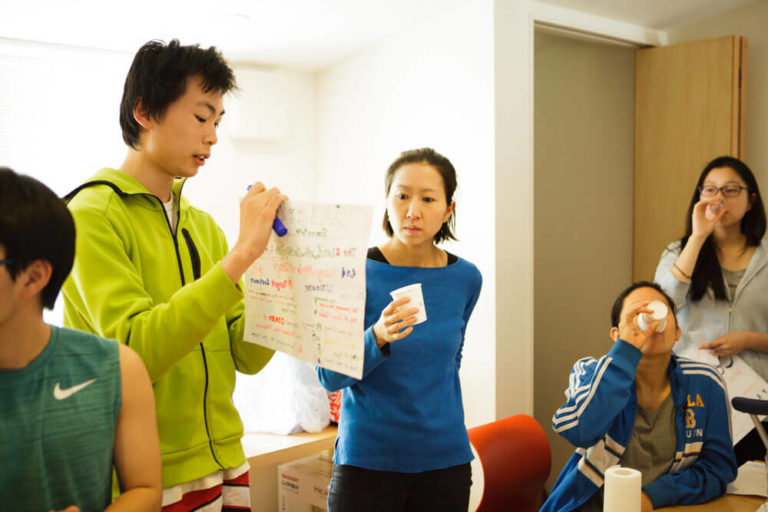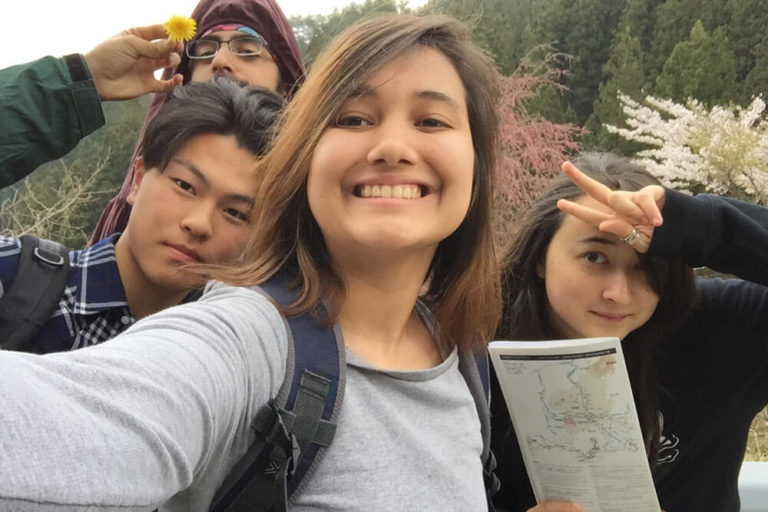Few would argue that 2020 was a rollercoaster of a year. For recent grad Gab Ponon (Philippines / Class of 2020), the past twelve months delivered a year with more ups and downs than he could have imagined. But a remarkable sense of resilience and positivity have carried him through the trials, and he is finding innovative ways to support his community. Read on to learn more about Gab’s story.
Lockdown limbo after leaving campus
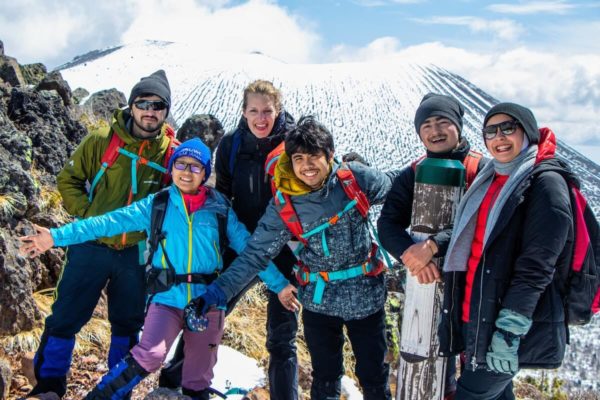 It’s incredible how much can change in the space of only one week. One week I was enjoying time with friends on the idyllic UWC ISAK Japan campus. The following week, I was all alone under lockdown in the concrete jungle. To say it was a shock to the system would be a gross understatement.
It’s incredible how much can change in the space of only one week. One week I was enjoying time with friends on the idyllic UWC ISAK Japan campus. The following week, I was all alone under lockdown in the concrete jungle. To say it was a shock to the system would be a gross understatement.
My new environment was a real struggle for me, but if I had learned anything during my time at UWC ISAK, optimism and grit are near the top of the list. Learning to navigate this new bizarre bubble was uncomfortable at first. On top of accepting my situation, it took some time for life to become much more manageable. I tried to keep myself busy instead. I was reading a lot and tried to learn as much as possible from online courses, despite the notoriously slow Manila internet.
Shocked into action by what I saw
Outside of my room, things were developing in a far different direction. I witnessed authorities putting quarantine violators into dog cages. Police colors took on military hues, arrested journalists without apparent justification, and shut down a key news channel. People like myself fearfully navigate through the very harsh terms of “enhanced community quarantine.” It was such an intense time, but now I can see that this experience planted several seeds of inspiration in me that would later come to life.
Reunited, and it feels so good
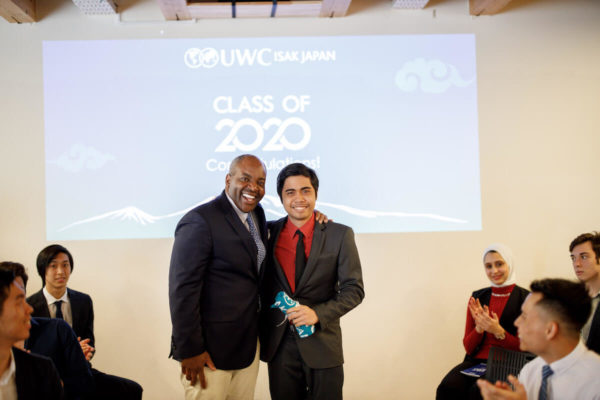 Imagine my relief when it was finally time to go home. After a year and a half, I finally met my family again. Life in the countryside was far more relaxed. Well, at least when compared to Manila, but quarantine measures were still in place. In the general comfort of home and surrounded by loved ones, it was then that I finally started working on a new project inspired by my time in Manila.
Imagine my relief when it was finally time to go home. After a year and a half, I finally met my family again. Life in the countryside was far more relaxed. Well, at least when compared to Manila, but quarantine measures were still in place. In the general comfort of home and surrounded by loved ones, it was then that I finally started working on a new project inspired by my time in Manila.
Leadership means identifying a need and taking action
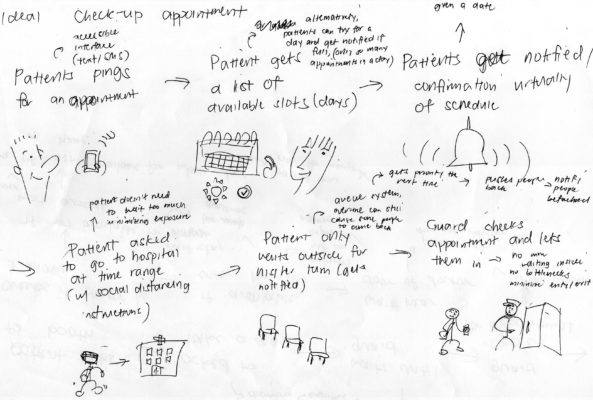
If living alone taught me anything, it was to be observant. In Manila, shopkeepers had to keep a record of customer visits. The government said it was for contact tracing when the need would arise, but I questioned how could they possibly use it? I tried to do my part and wrote legibly and clearly, though I noticed that not everyone took much care in this regard. There had to be a better way.
At UWC ISAK, I learned not to shy away from exploring ideas and interests, especially when needed and important. I took regular notes on my observations, and, as I’d learned in Mr. McGibbon’s Design Thinking class and other books I’d studied, I needed to approach the problem with the end-user foremost in mind.
Coming up with a plan for a contract-tracing application
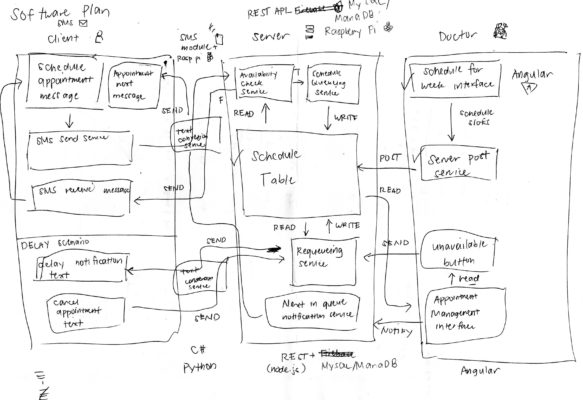 I crafted diagrams, scribbled sketches, mapped my own experiences, and worked to combine these with what I imagined other users’ experiences might be. Inspired by a nearby city’s solution, I heard about using phones to record information from personalized QR codes; I set about creating a contact-tracing application of my design.
I crafted diagrams, scribbled sketches, mapped my own experiences, and worked to combine these with what I imagined other users’ experiences might be. Inspired by a nearby city’s solution, I heard about using phones to record information from personalized QR codes; I set about creating a contact-tracing application of my design.
This QR code would be a photo kept on your phone. To sign up, you needed decent WiFi connectivity, which is a problem in some areas. My solution needed to be downloadable, lightweight, and functional offline. Privacy is also vital, so it couldn’t store personal information in a way that might leak private data to advertisers. This scenario played out in the town I mentioned earlier that forced them to suspend their program.
A key Design Thinking principle is to keep the end-user in mind
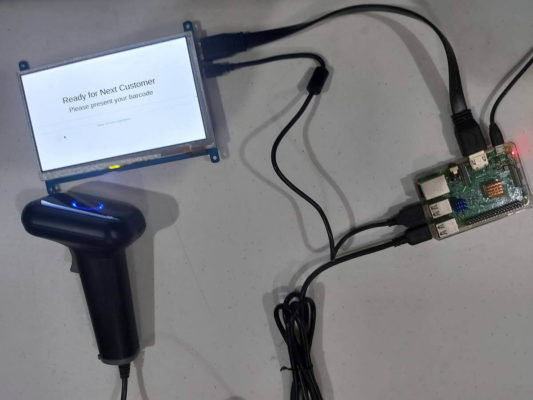 As I wrestled with the system design, the lessons I learned at UWC ISAK challenged me to empathize with the end-user. What functions or considerations are they looking for in a system like this? As I progressed, I consider how powerful a practice it is to take a very open-minded, multi-faceted approach to design a piece of technology. It also struck me how much more resourceful you can be when acting purely to help others.
As I wrestled with the system design, the lessons I learned at UWC ISAK challenged me to empathize with the end-user. What functions or considerations are they looking for in a system like this? As I progressed, I consider how powerful a practice it is to take a very open-minded, multi-faceted approach to design a piece of technology. It also struck me how much more resourceful you can be when acting purely to help others.
Selling my idea for a contract-tracing application
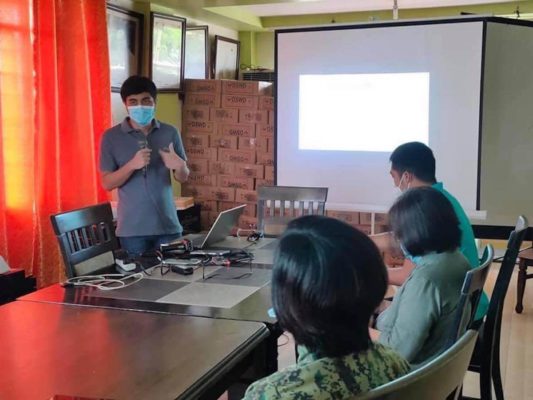 However, after a while, I came to the all-important question, how do you get this implemented? One of my significant influences is my father, a local town legislator well-known for proposing the benefits of technological applications for local bureaucratic transactions. Asking him to help was a no-brainer. Convincing him of the plan, however, was more difficult.
However, after a while, I came to the all-important question, how do you get this implemented? One of my significant influences is my father, a local town legislator well-known for proposing the benefits of technological applications for local bureaucratic transactions. Asking him to help was a no-brainer. Convincing him of the plan, however, was more difficult.
Despite my dad’s position, it wasn’t an easy sell. But eventually, I convinced him of the merits of my plan, and he agreed to support me. When I presented to local representatives, they very favorably received my proposal. Now, a copy of the software is in the town’s hands, going through dry runs before they can roll it out. I hope that it will get fast-tracked, but this process always takes time.
As I wait for the regulatory process to work its course, I am focused on improving the application to bring down costs and enhance portability. My next task will be to introduce one-tap Bluetooth file transfer functionality.
Why I opted for an open-source approach
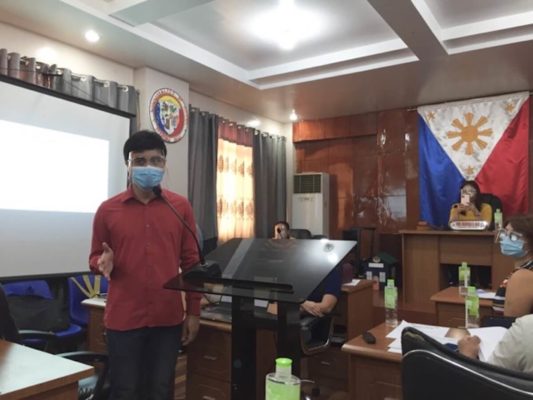 My plan from the beginning was not to sell this at all. In fact, throughout development, I made my code available online. The reasoning behind this was simple: it lowers costs. The other city I mentioned before was relatively successful in keeping infections down despite having a much larger population density. An undeniably crucial element was an application just like this.
My plan from the beginning was not to sell this at all. In fact, throughout development, I made my code available online. The reasoning behind this was simple: it lowers costs. The other city I mentioned before was relatively successful in keeping infections down despite having a much larger population density. An undeniably crucial element was an application just like this.
Imagine then if this system worked. People from other towns could go and ask my town to replicate its success. Knowing that the costs for development are very low makes this a much more likely scenario. Furthermore, other companies and startups could build on the software to benefit their communities. I imagine that it can only get better from here. My contribution to all of this would be to have established a standard supporting other people’s needs first.
Leadership is a practice
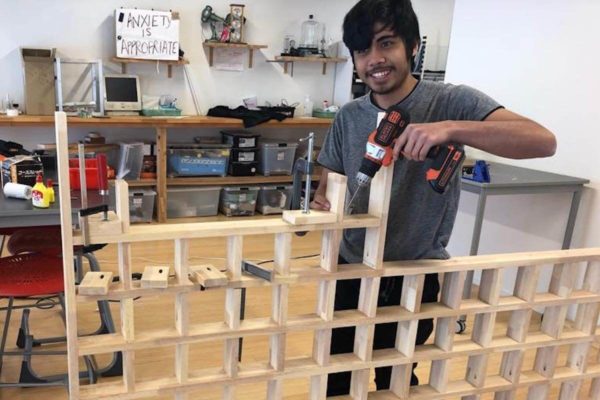 At UWC ISAK Japan, I learned that leadership is a practice. I learned to be more mindful of my actions and towards others. This practice is invaluable in design, as it helps me better empathize with end-users. Ultimately, this practice helps me be a more considerate and better human overall.
At UWC ISAK Japan, I learned that leadership is a practice. I learned to be more mindful of my actions and towards others. This practice is invaluable in design, as it helps me better empathize with end-users. Ultimately, this practice helps me be a more considerate and better human overall.
For me, this project is just the beginning. Over the past months of being at home, there were other projects that I tried out: turning any printer into an online printer, cost-effective offline legal record-keeping, and my personal favorite, Messaging Engines for Medical Organizations.
Resilience is a key to success
However, these past few months have also had their challenges. Back home, we jokingly say our place is a land “ng walang katapusang dilubyo” (of never-ending natural catastrophe). We went through a month of the strongest storms we’ve ever encountered, one after the other, for four weeks. There was flooding throughout, leaving places like my childhood home ruined with boulders and mud. Electricity was also down for a very long time.
However, I’d also like to believe that ours is a place “ng walang hanggang pananalig” (of never-ending faith). This value of always building up and never backing down from even the most difficult adversities is a value I am proud we possess and one that inspires me every day.
My new university life
I am currently taking Engineering Physics at Case Western Reserve University. After many months of trying and waiting, I finally made it to school for my first year. Most of my classes and many university activities are online, but that hasn’t stopped me from living out my newfound passions.
For one, I’m part of the Humanitarian Design Corps, and we’re working on making more sustainable bus stop lighting. I’m also part of a Design for America team, working on a calendar of events to empower people with developmental disabilities to connect. I also started a project called Omnibus, an open-source tracking system for buses on campus, which we can hopefully share with college campuses across the country.
The UWC ISAK Japan impact on my life
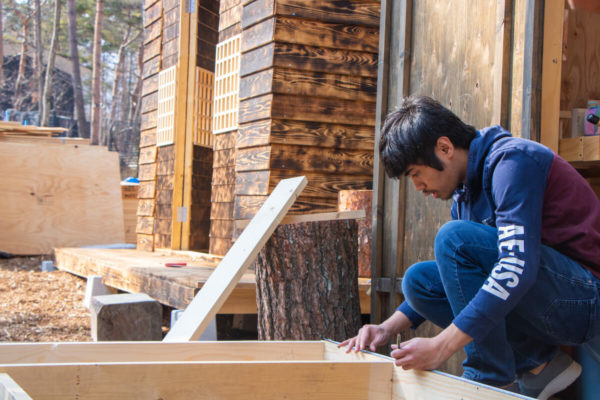 UWC ISAK had a tremendous impact on my thinking and understanding of the world. Being part of the community immersed me in values that focus on learning about others and seeing the world from their perspective. It wasn’t only the conversations over lunch or the many sessions in class. It was also getting to be with people very different from you in all aspects of high school life, which can teach empathy, understanding, and compassion.
UWC ISAK had a tremendous impact on my thinking and understanding of the world. Being part of the community immersed me in values that focus on learning about others and seeing the world from their perspective. It wasn’t only the conversations over lunch or the many sessions in class. It was also getting to be with people very different from you in all aspects of high school life, which can teach empathy, understanding, and compassion.
My last three months at ISAK were crucial for me. It was a time when I was free enough to feel what it meant to be part of a community. It was also a time when I got to forge some of my most precious and meaningful relationships.
Through it all, I’ve come to believe I work no longer just for myself but for others. I learned to work not only for my community but for other communities as well. My incredible friends taught me to believe in myself, be kind, compassionate, and aspire for justice and the betterment of those around me. I do this to honor what I learned during what I now know to be the best two years of my life.
A little bit of advice
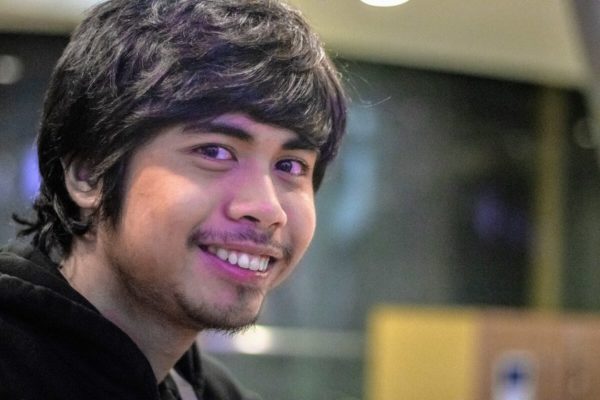
My advice to everyone at UWC ISAK: enjoy and embrace these life experiences that you have. UWC ISAK is a unique place, but it is up to you what you make of it. It’s the right place to grow as a person with values, and once learned sufficiently, I can guarantee that you can approach any adversity with integrity and look to the future with hope.
To those looking to make a difference, my advice is to be a better listener. Please keep your eyes open to others’ needs and see what it’s like in their shoes. Try to understand other points of view while never shying away from learning something new. You will be surprised how many things you will come up with, and a newfound sense of possibility will refresh you.
Sincerely,
Gabriel Ponon (Philippines / Class of 2020)
